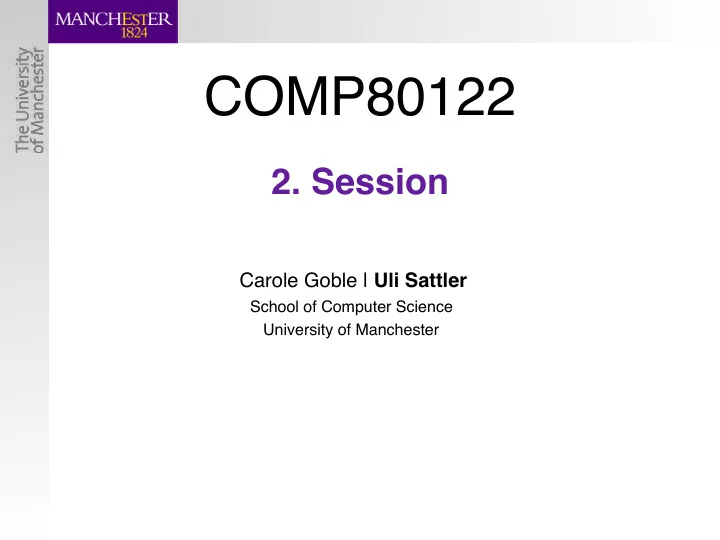

COMP80122 2. Session Carole Goble | Uli Sattler School of Computer Science University of Manchester
Welcome to COMP80122 • CDT and PhD students take 3 research seminars: – COMP80131 - P2 - Barry & Goran – COMP80122 - P3 - Carole & me – COMP80142 - P4 - Bijan & Renate • ...plus 1 session in November 2015: – as preparation for research symposium – ...for which you wrote critiques – ...as a reflection on scientific presentations
Before we start... • if you weren’t here in November • and/or you didn’t submit any critiques yet speak to me after at 12:45 Check Attendance • ...if you don’t, you can’t pass COMP80122 Sheet!
Before we start...schedule: • First 3 weeks: 1. Discussion of Research Symposium Presentations 2. More about Storylines, Research Hypotheses, etc 3. Organisation & Practical Guidelines (coping with nerves) 4. Handling the Literature 5. You and your supervisor & tidying up of organisation • ...then • split you in 4 groups (2 with Carole, 2 with me) see organisation above • you give a 15 minute presentation about your research • ...which we will discuss in all detail ➡ participation is mandatory
Your Presentation in COMP80122 • an opportunity for you to reflect on your role as presenter • pick an approach in a safe environment – not your End-of-Year examination – only for your group • with loads of (hopefully helpful) feedback • start into a life-long learning experience – constant reflection/observations/thoughts/improvements • …as a group member, more opportunities to – discuss approaches to presentation – reflect on communication of research – learn more about research in CS
Communication of CS Research • Does it matter? • Do you need to be able to communicate your contributions? – Results can speak for themselves! • Why (not)? • A presentation is a monologue no/little space for – questions – clarifications – explanations
Communication of CS Research • Does it matter? • Do you need to be able to communicate your contributions? – Results can speak for themselves! • Why (not)? ? … blah..
The Three Pillars The story The speaker The slides • • story lines • bullet lists body language • clarity • graphics – focus • • level • fonts preparedness • • timing • highlights voice • use of terminology • ... – volume – speed • ... – clarity • nerves • ... Effects on you/audience by choices to these? What was helpful to get message across?
Storyline: relevant questions • Setting the scene? – which research area are we in? – what kind of problem is addressed? – why is that interesting/relevant? • Focus: – was a Research Hypothesis/Question mentioned? • Methodology/approach/work done: – could you understand what has been done? • Context: – was the work done put in context? • Contributions made: – did you understand the outcome of the work done? – what are the new insights gained? – did these fit with the research hypothesis/question? • Outlook/next steps/open questions?
Slides • support storyline – give structure – make things more clear – illustrations – e.g., “3 advantages” – e.g., graphics • should not distract from the speaker!
The Speaker - Stage Presence • Stage presence, body language, voice,… – give context/mode, e.g., • surprise • slog • hard work – help audience follow talk – support understanding – can make a talk • entertaining • enjoyable – or • annoying • hard work • boring • impossible to understand
Discussion of Research Symposium Presentations
People and sites mentioned • Videolectures for numerous recordings of presentations – http://videolectures.net/ • Dave Gorman for great use of slides – http://www.davegorman.com/ • Hans Rosling for talking nicely & clearly with a foreign accent and for some more examples of – good use of graphics – great entertainment – great communication of tricky, technical statistics! – e.g., find his TED talk!
Recommend
More recommend